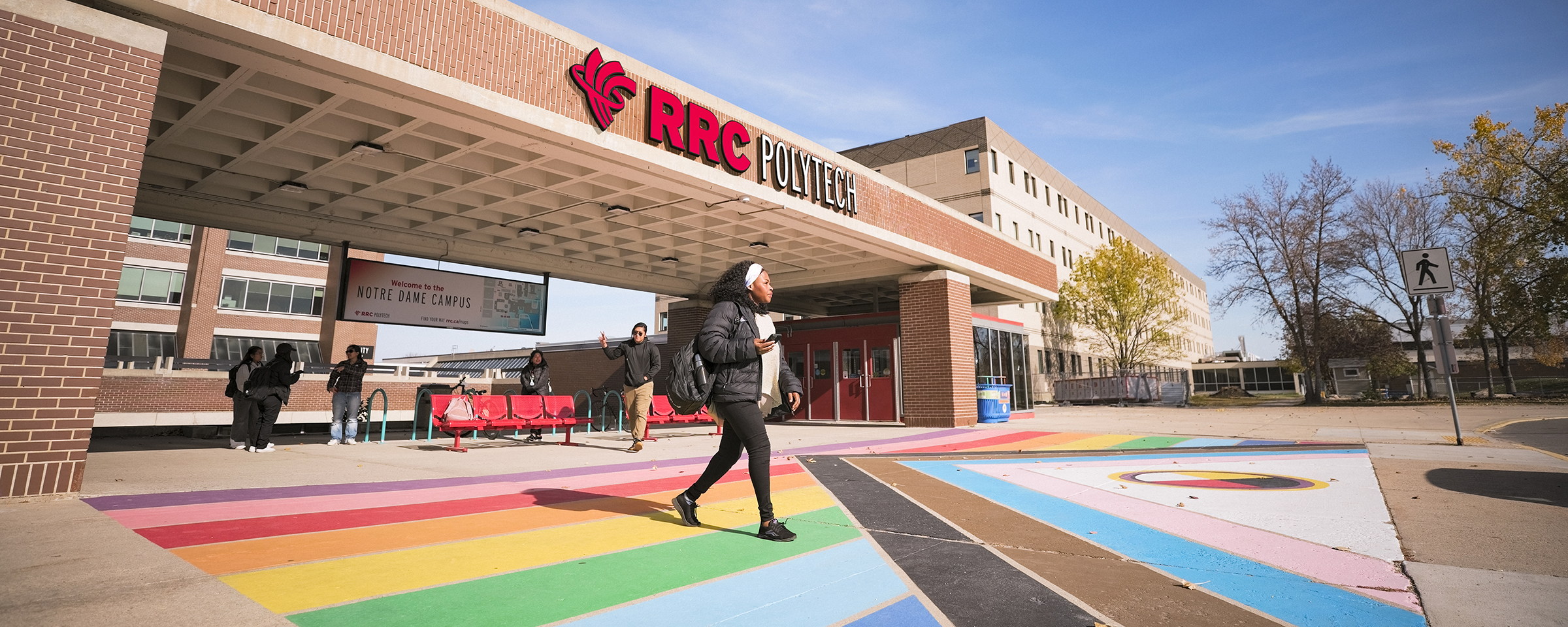Hive mind: RRC launches urban beekeeping initiative on downtown dormitory rooftop

Red River College’s downtown dormitory is home to more than just students this summer. The rooftop patio at Paterson GlobalFoods Institute is also the new seasonal home of our very own buzz-worthy urban beehives.
A fixture at PGI since early July, the three hives each house between 40,000 and 50,000 European honeybees, a docile but still industrious breed expected to produce up to 75 kilograms of honey by this fall.
Until that time, they’re being tended to by Beeproject Apiaries’ Chris Kirouac (shown above) and Lindsay Nikkel, a husband-and-wife team of former nurses who describe their sticky venture as a DIY hobby gone wild, and with whom RRC’s Sustainability department struck a honey of a partnership earlier this year.
The resulting initiative is a perfect match with the College’s mandate on sustainable practices, offering environmental benefits (via the pollination of nearby greenspaces) and the opportunity to add another locally sourced food product to RRC’s menu — one that arrives at the table in very nearly its natural state.
“Honey is one of those amazing foods that’s better the less refined it is,” says Kirouac, noting the harvested honey is bottled in a CFIA-inspected facility, but not pasteurized or refined in any way. “The quality and safety of honey — right when you crack the hive and stick your finger in there — means it’s good to go, just the way it is.”
Once extracted, the honey will be used by students in PGI’s culinary labs (including in the kitchen of restaurant Jane’s), and by Food Services departments at all three Winnipeg campuses. It’ll also be available for purchase at College events throughout the year, including a new farmer’s market planned for the Notre Dame Campus this fall.
With the addition of the hives to the roof, RRC joins a growing list of downtown denizens — among them Manitoba Hydro, the CBC, and the University of Winnipeg — signing on with Beeproject’s urban pollination plan, which only became a possibility last February, after the city amended its zoning laws to allow for rooftop apiaries in the district.
 “The rooftop sites get good sun exposure, which the bees like,” says Kirouac. “Red River’s rooftop is not particularly windy because it’s sheltered from the north, and there’s a lot of greenspace in the little parks and along the riverbanks.
“The rooftop sites get good sun exposure, which the bees like,” says Kirouac. “Red River’s rooftop is not particularly windy because it’s sheltered from the north, and there’s a lot of greenspace in the little parks and along the riverbanks.
“So the honey is quite lovely because it comes from a variety of floral sources, and the bees have a well-balanced diet. They seem to be doing really well up there.”
Anyone worried the Exchange District will now be dotted with angry swarms needn’t fear. Bees tend to disperse while foraging for pollen — a process that can take them up to five kilometres from their home base — and only get testy if someone enters or blocks the opening to their hive. (Unlike wasps, they die after their first sting.)
As Kirouac explains, urban beehives also promote biodiversity within cities and provide valuable opportunities for people to learn more about nature and our food systems.
“[These bees are] responsible for about a third of our food production globally, and even in Manitoba, they’re very important for crops and for people’s gardens and apple trees,” he says.
“Without them, the sustainability of our food systems can really suffer, and we can have huge problems with our growing population of people.”
If you’re interested in seeing RRC’s rooftop hives for yourself, Kirouac and Nikkel are conducting weekly demonstrations all season. Just fill out this form — those interested will receive an email alert 24 to 48 hours before each demo, with spots filled on a first come, first served basis.
To learn more about Beeproject Apiaries, visit their website or follow them on Instagram.
